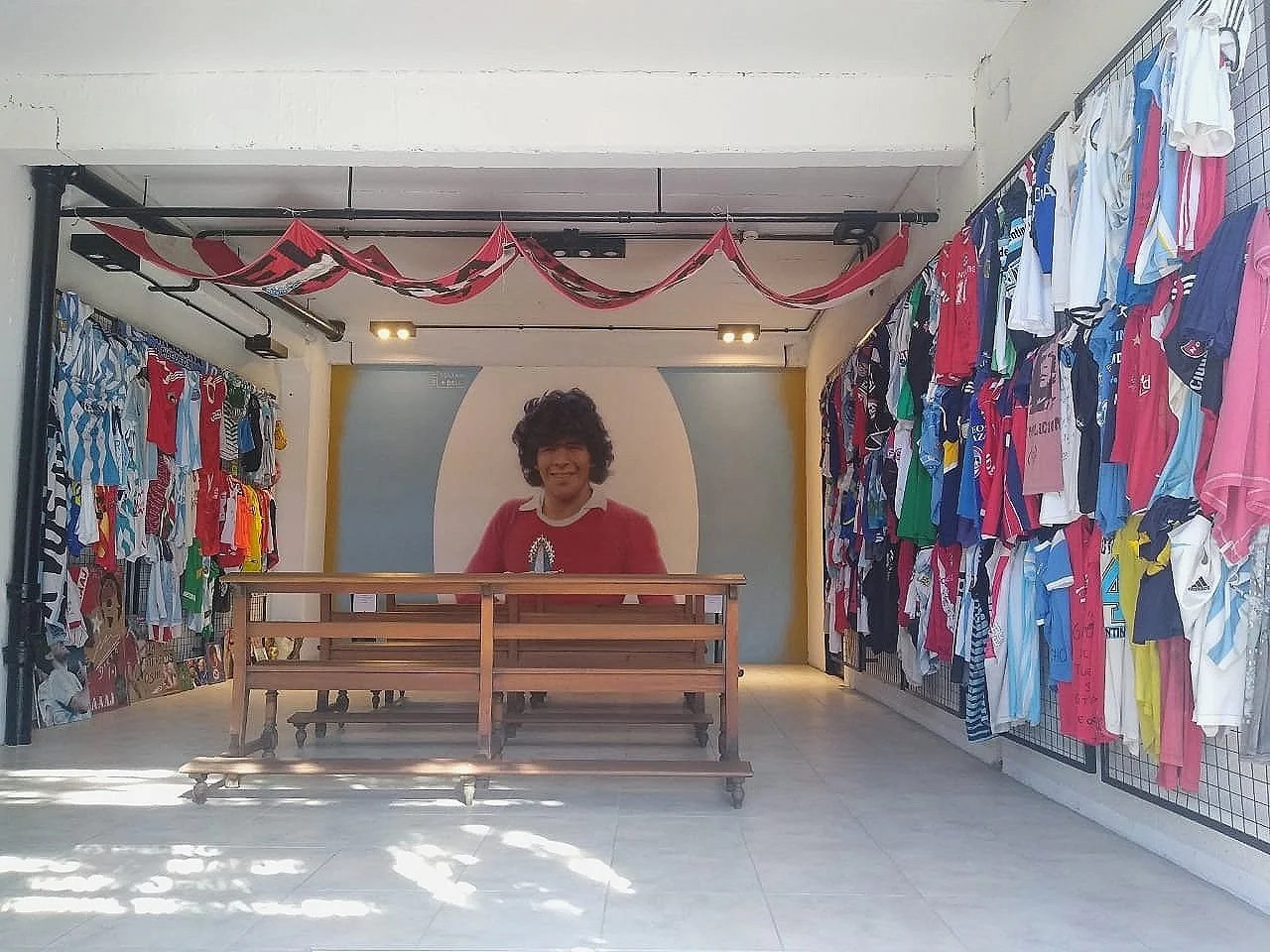The Hands of God
by Dominic Hilton
December 2021
Hiding in Buenos Aires, on the first anniversary of the death of Diego Maradona.
It’s the first anniversary of Diego Maradona’s death, and I’m hiding inside my Buenos Aires apartment, glued to a TV documentary about Argentines who’ve had the football icon’s face tattooed onto their shaved scalps, flabby thighs, pockmarked buttocks and droopy man boobs. The documentary is followed by a rerun of a talk show in which fifteen to twenty stark-naked women line up to snog “El Diego” before he signs their bare, jiggling breasts with a thick black marker pen handed to him by the host.
It’s 11:30am. I sip some yerba mate, watching the big-haired models totter about the softly furnished TV studio on impractically-high heels. I wonder who they are, and whether, like me, they are also watching the show, also missing Diego. Their buxom bodies have been painted to make it look like they are wearing skin-tight football kits. In reality, the gossamer coats of bright paint only serve to highlight the young women’s nudity, and every few seconds, the cameramen zoom in on their assets. Maradona’s slug-like eyebrows jump to his hairline as he gets busy adding his signature to their skin. I picture the scene backstage after the credits roll, a sort of reverse gangbang, with “D10S”, as he is commonly known here, barely knowing where to next put his tiny little hands.
My phone pings. It’s my friend Rodrigo. “Seen this?” he wants to know. It’s a news story about Mavys Álvarez Rego, a former Cuban girlfriend of Maradona’s. Álvarez has testified in Buenos Aires that she was an underage victim of human trafficking, was forced to have cosmetic surgery for breast enlargement, became a drug addict during her relationship with “El Diego”, and was violently abused and raped while being held against her will.
“Of course,” I reply.
On the TV, there’s a tribute concert: “a repertoire of songs inspired by the 10”. #DiegoEterno it says in the bottom corner of the screen, on all channels. On the streets of Buenos Aires, “D10S” is still omnipresent. That’s him, on billboards for an original drama series streaming on Amazon Prime, Maradona: Blessed Dream. There he is again, on posters for Beyond Diego: the documentary that honors Maradona. That’s him, too, on adverts for The Good, The Bad and The Diego; for El Diego: the people do not forget; for The Last Days of Maradona, the latest Spotify podcast investigating the death of the legend.
“Deifying murals and frescos of Maradona decorate the city’s walls, fresh ones cropping up every new day, seemingly out of nowhere.”
Deifying murals and frescos of Maradona decorate the city’s walls, fresh ones cropping up every new day, seemingly out of nowhere. Habitually, Diego’s face appears alongside those of “Che” Guevara and Fidel Castro. The populist Argentine government has declared the slum where “El Pibe de Oro” (“The Golden Boy”) was born a national heritage site. The newspapers and networks are breathless with breaking stories about his neurosurgeon, his psychiatrist, his psychologist, his medical coordinator and his nurses, all of whom have been charged with his manslaughter. The courts play host to endless legal battles over the inheritance of his fortune, of a BMW with his signature engraved on the windscreen. Mysterious lovers and children are forever emerging from the woodwork, eager to get theirs.
My phone pings again, making me wish I’d left it in another room. “What’s all this about Maradona’s heart?” asks a friend in London.
“His fans were planning a heist,” I reply. “They were going to rob his grave and steal his heart—so he was buried without it.”
My friend responds a minute or two later with a facepalm emoji.
Another friend gets in touch, this time from Uruguay. “You have to write again about Diego!”
I tell him I’m not sure, that I don’t really want to, that I’ve probably said all I have to say about the guy. “Balls!” he shouts. “Diego is a bottomless well! Tap that shit!” But writing about Maradona makes me feel like the fifth evangelist, called upon to spread the gospel, and I can gladly do without that sort of responsibility.
My eye muscles start to tighten. Stress. Diego is doing this to me—again—from beyond the grave. On the TV, another melodramatic documentary, this time with sickly-sweet piano accompaniment. The interviewees shed tears alongside slow-motion archival footage of Maradona scoring his infamous “Hand of God” goal against England at the 1986 World Cup. Anxiety nausea overwhelms me. I’m going to be sick. ¡Gracias Diego!
Ping! Another friend, sharing a song on YouTube, posted yesterday. The song is titled “Ciro Ferrara and an emotional memory of Maradona: "Tomorrow we will wake up with a heavier heart".” For the next five minutes, I mute the TV and listen to the beefy former Napoli defender sing his old teammate an emotional tribute song in Italian.
My thoughts drift back to an evening a few weeks before. I had met my friend Sander at Chichilo, a small restaurant in a semi-sketchy area of La Paternal. Chichilo is an old school, family-run Italian eatery, renowned for being the favorite neighborhood joint of a young Diego Armando Maradona. Diego used to eat there all the time when he was coming up with Argentinos Juniors, and local legend has it that he used to get the food from Chichilo flown over to Naples during his glory years, when he played for Napoli.
I arrived at the restaurant before Sander, and when I clattered through the narrow door, the place went deathly silent, as if somebody had yanked a needle off a record. Customers gawped up at me from their tables, forks frozen in midair, their mouths hanging open. A sturdy woman approached me with a frown. “Can I help you?” I explained that I had a reservation and she slipped her glasses onto her nose. “For real?”
Yes, for real. The woman took her time studying an open logbook, then ushered me to my waiting table, next to a section of wall signed in large, silly handwriting by Diego. A waiter approached, asking where I was from, what I was doing there, his eyes narrow and suspicious. I explained that I was English, but that I lived in Buenos Aires, and he stared intensely, soliciting my opinion on Las Malvinas. The eyes of the entire restaurant were now upon me and everybody leaned forward in their creaky chairs, waiting to hear my response.
“¡Las Malvinas son argentinas!” I declared in as loud as voice as I could muster, and the room erupted. Cheers rang out. My hand was shaken, my back slapped. “Gracias! Gracias, amigo!” everyone cried, and from that point on, I was the celebrity of the bustling restaurant.
“He came here from London. He says the Malvinas are Argentine! Did you hear? Go shake his hand!”
The owners hovered merrily over my table. “What is your opinion of Margaret Thatcher? Of Queen Elizabeth II?” I chose my words carefully. Then, inevitably, we got to talking about Maradona. Most of the stories I knew from Sander, but as the owners pointed to the assorted Diego paraphernalia adorning every wall, their chests swelled with pride and their eyes filled with tears. “Diego lives forever!” shouted somebody behind me. “It’s the truth!” came a volley of zealous voices in reply.
Diego, the opium of the masses, the humble slum boy who gives hope to the poor: hope that one day, they too will be recognised as golden. They won’t, of course. None of them possess Diego’s genius. But Maradona proved that children born in the slums can matter, can count, can become earthly gods, even from Heaven.
“Maradona proved that children born in the slums can matter, can count, can become earthly gods, even from Heaven.”
“Argentina searches for its soul” screams a headline on my phone. “Polls indicate people’s expectations for the future have tanked”. So, as always, Argentina turns to its former glories. To D10S conquering the world.
My mind stops racing, and I stare back at the TV. A Coca-Cola commercial is followed by a public service announcement by the City of Buenos Aires. “When you take your pet out for a walk, remember to bring a bag to dump his poop.”
The announcement includes a short animation. A man is out walking his dog, but he’s forgotten to bring a bag with him, so when his dog stops to take a shit, he has nothing with which to scoop up the steaming mess.
But then the skies part and an arm reaches down from the heavens to hand the man a little bag, which he gratefully accepts, and uses to pick up and bin the poop. It is, of course, the hand of God, and my vision begins to blur again. ¡Gracias Diego!



